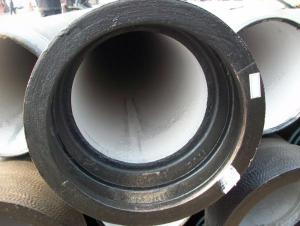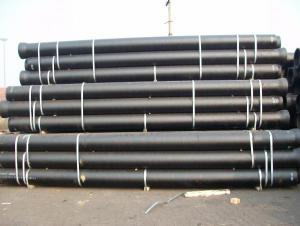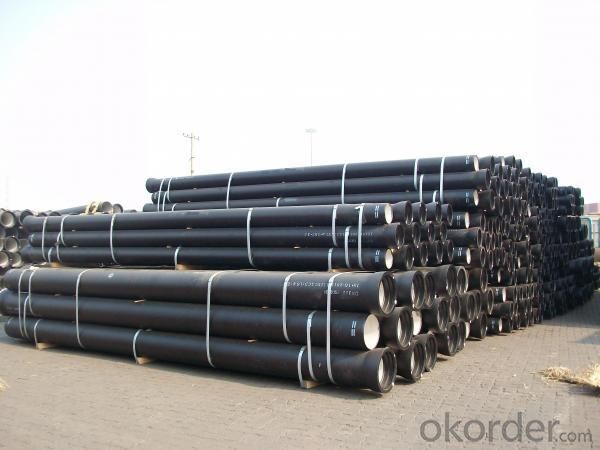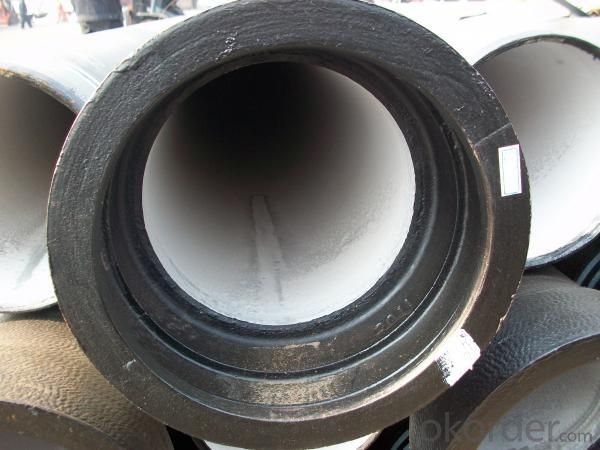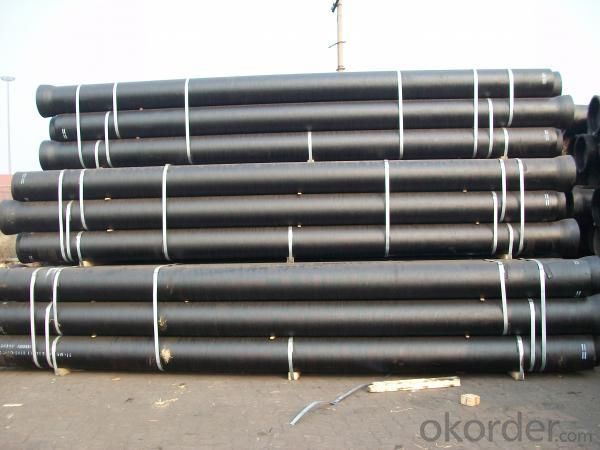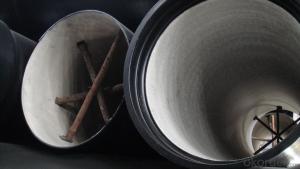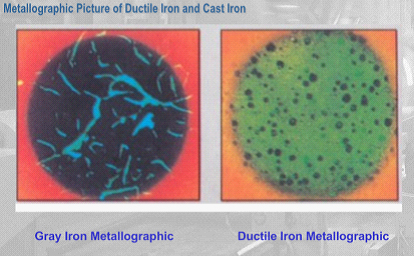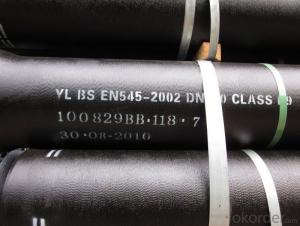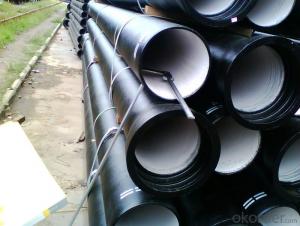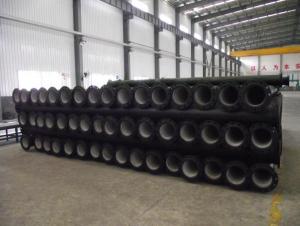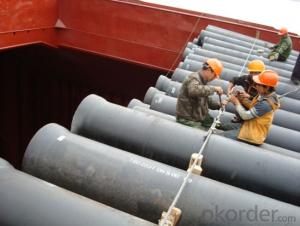Self-restrained Joint Ductile Iron Pipe
- Loading Port:
- China Main Port
- Payment Terms:
- TT or LC
- Min Order Qty:
- 1 Metric Ton m.t.
- Supply Capability:
- 300000 Metric Tons per Year m.t./month
OKorder Service Pledge
OKorder Financial Service
You Might Also Like
Overview of Ductile Iron Pipe
Ductile cast iron, also called ductile iron, spheroidal graphite iron, or nodular cast iron, is a type of cast iron invented in 1943. While most varieties of cast iron are brittle, ductile cast iron is much more flexible and elastic, due to its nodular graphite inclusions.
Graphite particles exist in the form of sphericity in ductile cast iron. Sizes graphite particle are restricted to 6 -7 class and spheroidizing rate should not be less than 80%. Thus after the spheroidizing process, ductile iron will be endowed with mechanical properties of both cast iron and steel.
Much of the production of ductile iron is in the form of ductile cast iron pipe, used for water supply and sewerage design. Ductile cast iron pipe is stronger and easier to tap, requires less support and provides greater flow area compared with pipes made from other materials like PVC, concrete, polyethylene or steel. Ductile Iron Pipe is the most widely-used pipeline product in water supply and water drain/sewage projects.
General introduction of Self-restrained Joint Ductile Iron Pipe
•Material : Ductile Cast Iron
•Size Range : DN 80mm to DN 1200mm
•Unit Effective Length : 6m or 5.7m or negotiable
•Manufacture Standard: ISO 2531:1998/ EN 545:2006/EN 598:2007
•Annual capacity : 300,000 tons
•Coating Exterior: Zinc 130g/m2 according to ISO 8179-1 and bitumen coating 70 microns.
•Cement Interior: Portland Cement/ High Alumina Cement/ Sulphate Resisting Cement Lining according to ISO 4179
•Special requirements on external coating and internal lining can be applied
•We also provide accessories such as SBR/EPDM rubber gaskets, lubricant paste, pipe caps, PE sleeves, etc.
Mechanical Properties
|
Item |
Tensile Strength (N/mm2) |
Elongation(%) |
Proof Stress (N/mm2) |
Hardness HB | ||
|
DN80 TO DN2600 |
DN80 TO DN1000 |
DN1100 TO DN2000 |
DN80 TO DN1000 |
DN100 TO DN2000 | ||
|
Pipe |
≥420 |
≥10 |
≥7 |
≥270 |
≥300 |
≤230 |
|
Fittings |
≥420 |
≥5 |
≥300 |
≤250 | ||
Standard Lining and Coating
External Protection
Metallic zinc complying with the standard ISO8179,and bitumen,or special protective coating according to the customer’s requirement.
Notes:
. Pipes and fittings conform to the requirements of International Standard ISO 2531,British Eurpean Standard BS
. EN545,and their extensions. If information given in English and Chinese differs,the English version prevails.
. Dimensions and masses of pipes and fittings are approximate and are for refererces only;accurate dimensions and
. masses should be confirmed with us at the time of placing order. Flanged joint pipes and fittings are generally
. available with PN10,PN16 and PN25. Socketed joint pipes and fittings generally available with T type and K type joints.
Features of Self-restrained Joint Ductile Iron Pipe:
. Ductile Iron Pipe offers proven reliability and the quality.
. It is quick and easy installation.
. The ductile iron pipe has high pressure capability.
Application:
Used for water and sewer lines.
Production Process
Much of the production of ductile iron is in the form of ductile cast iron pipe, used for water supply and sewerage design. Ductile iron pipe is stronger and easier to tap, requires less support and provides greater flow area compared with pipes made from other materials like PVC, concrete, polyethylene or steel.
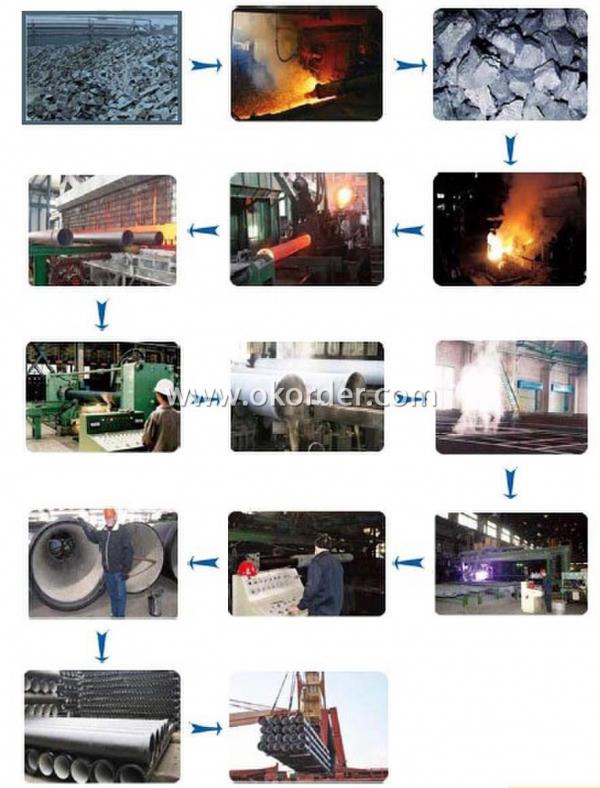
Specification of Self-restrained Joint Ductile Iron Pipe:
Standard wall thickness of Self-restrained Joint Ductile Iron Pipe
|
Nominal Diameter |
Wall Thickness(mm) | ||||||
|
DN(mm) |
Pipe |
Fittings | |||||
|
Class C |
K8 |
K9 |
K10 |
K12 |
K12 |
K14 | |
|
80 |
4.4 |
6 |
6.0 |
7 |
8.1 | ||
|
100 |
4.4 |
6.0 |
7.2 |
8.4 | |||
|
125 |
4.5 |
6.3 |
7.5 |
8.8 | |||
|
150 |
4.5 |
6.3 |
7.8 |
9.1 | |||
|
200 |
4.7 |
6.3 |
8.4 |
9.8 | |||
|
250 |
5.5 |
6.8 |
7.5 |
9 |
9 |
10.5 | |
|
300 |
6.2 |
6.4 |
7.2 |
8 |
9.6 |
9.6 |
11.2 |
|
350 |
6.3 |
6.8 |
7.7 |
8.5 |
10.2 |
10.2 |
11.9 |
|
400 |
6.5 |
7.2 |
8.1 |
9 |
10.8 |
10.8 |
12.6 |
|
450 |
6.9 |
7.6 |
8.6 |
9.5 |
11.4 |
11.4 |
13.3 |
|
500 |
7.5 |
8 |
9 |
10 |
12 |
12 |
14 |
|
600 |
8.7 |
8.8 |
9.9 |
11 |
13.2 |
13.2 |
15.4 |
|
700 |
8.6 |
9.6 |
10.8 |
12 |
14.4 |
14.4 |
16.8 |
|
800 |
9.6 |
10.4 |
11.7 |
13 |
15.6 |
15.6 |
18.2 |
|
900 |
11.6 |
11.2 |
12.6 |
14 |
16.8 |
16.8 |
19.6 |
|
1000 |
12.6 |
12 |
13.5 |
15 |
18 |
18 |
21 |
|
1200 |
13.6 |
13.6 |
15.3 |
17 |
20.4 |
20.4 |
22.8 |
|
1400 |
15.7 |
15.2 |
17.1 |
19 |
22.8 |
22.8 |
26.6 |
|
1500 |
16.7 |
16 |
18 |
20 |
24 |
24 |
31 |
|
1600 |
17.7 |
16.8 |
18.9 |
21 |
25.2 |
25.2 |
29.4 |
|
1800 |
19.7 |
18.4 |
20.7 |
23 |
27.6 |
27.6 |
32.2 |
|
2000 |
21.8 |
20 |
22.5 |
25 |
30 |
30 |
35 |
Self-restrained Joint
Self-restrained Type is a push-in self anchored joint. The principle of joint anchoring consists in transmitting the axial forces from one pipeline to the following one, thus ensuring that the joint does not come apart.
The application of self-restrained joints is of particular interest where congested conditions preclude concrete anchor block constructions or in poorly cohesive soils.Self-restrained joints combine the advantages of flexible joint pipes and welded joint pipes.
Photo of Self-restrained Joint Ductile Iron Pipe
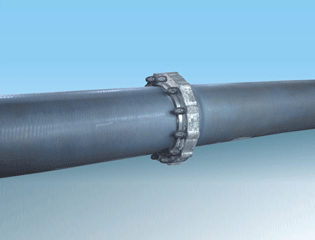
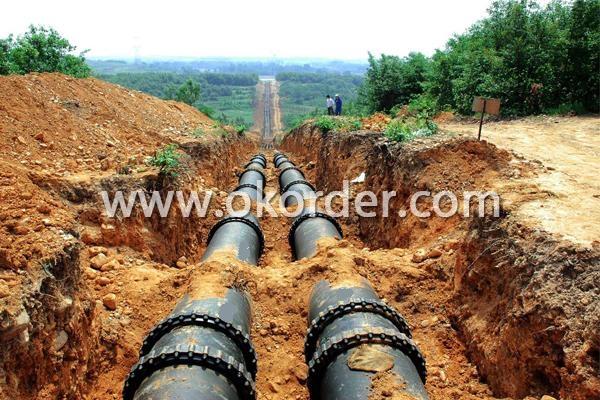
- Q: What is the minimum pipe diameter of cast iron pipe?
- Nominal diameter of continuous grey cast iron pipe is 75~1200 mm, minimum 75 mm, maximum 1200 mm.
- Q: How are ductile iron pipes protected against external corrosion?
- Ductile iron pipes are protected against external corrosion through a combination of manufacturing processes and external coatings. The first line of defense is the inherent corrosion resistance of ductile iron itself. The iron is treated with a special alloying element, typically magnesium, which forms a protective layer on the surface of the pipe. This layer acts as a barrier against corrosion and helps to extend the lifespan of the pipe. In addition to the corrosion-resistant properties of the iron, ductile iron pipes are also externally coated with protective materials. One common method is to apply a layer of asphaltic or bituminous coating to the pipe's surface. This coating acts as a barrier against moisture and corrosive substances in the soil, preventing them from coming into contact with the iron. It also provides a layer of insulation, reducing the likelihood of galvanic corrosion. Another method of external corrosion protection is the use of fusion-bonded epoxy (FBE) coatings. FBE is a thermosetting resin that is applied to the surface of the pipe and then heat-cured to form a strong and durable coating. This coating provides excellent resistance against corrosion, abrasion, and impact, making it a popular choice for ductile iron pipes in harsh environments. In some cases, additional protective measures such as cathodic protection systems may be employed. These systems use electric currents to counteract the corrosion process by supplying electrons to the pipe's surface. This helps to prevent corrosion from occurring, especially in areas where the coating may have been damaged or compromised. Regular maintenance and inspection are also crucial in ensuring the long-term protection of ductile iron pipes against external corrosion. This includes periodic cleaning, repair of any coating damages, and monitoring the integrity of the protective layers. Overall, the combination of the inherent corrosion resistance of ductile iron, external coatings, and maintenance practices ensures that ductile iron pipes are well-protected against external corrosion, allowing them to have a longer lifespan and deliver reliable performance in various applications.
- Q: Are ductile iron pipes suitable for fire protection systems?
- Yes, ductile iron pipes are suitable for fire protection systems. Ductile iron is a strong and durable material that can withstand high pressure and temperature fluctuations, making it ideal for fire protection systems that require reliable and long-lasting pipes. Additionally, ductile iron has excellent corrosion resistance, which helps to prevent the degradation of the pipes over time, ensuring the integrity of the fire protection system. The high tensile strength of ductile iron also provides added safety benefits as it can withstand the stress and strain that may occur during a fire event. Therefore, ductile iron pipes are a suitable and commonly used material for fire protection systems in various applications, including commercial buildings, industrial facilities, and residential areas.
- Q: Do ductile iron pipes require internal linings for potable water?
- No, ductile iron pipes do not require internal linings for potable water. Ductile iron is a type of iron that has been treated to enhance its strength and flexibility. It is commonly used for water distribution systems due to its durability and resistance to corrosion. Unlike other materials, such as cast iron or steel, ductile iron pipes have a protective layer called a cement-mortar lining, which provides an effective barrier against corrosion and prevents the leaching of any harmful substances into the water. This lining is applied during the manufacturing process and is designed to withstand the corrosive properties of potable water, making internal linings unnecessary. Additionally, the smooth surface of ductile iron pipes helps to maintain the quality and flow of water without the need for additional linings.
- Q: What is the difference between ductile iron and cast iron pipes?
- Ductile iron pipes and cast iron pipes are both popular materials for plumbing systems, but they differ in composition, strength, flexibility, installation methods, and cost. 1. Composition: Ductile iron pipes are made from a type of cast iron that has been treated with trace amounts of magnesium, enhancing its flexibility and strength. In contrast, cast iron pipes are made from regular cast iron, which is less malleable and more brittle. 2. Strength: Ductile iron pipes are significantly stronger than cast iron pipes, with higher tensile strength to withstand greater internal and external pressure. This makes them ideal for applications requiring high strength, such as water mains or sewer lines. Cast iron pipes, however, are more prone to cracking or breaking under pressure. 3. Flexibility: Ductile iron pipes have greater flexibility, allowing them to withstand ground movement without damage or breakage caused by settling or shifting soil. On the other hand, cast iron pipes are more susceptible to cracking or separating when exposed to ground movement or vibrations due to their inherent brittleness. 4. Installation: Ductile iron pipes are typically joined using mechanical or flanged joints, ensuring secure and leak-proof connections. In contrast, cast iron pipes are usually joined using bell-and-spigot joints, relying on gaskets or lead caulking for a seal. The mechanical joint used in ductile iron pipes offers better resistance to movement and external forces. 5. Cost: Ductile iron pipes are generally more expensive than cast iron pipes due to the additional treatment process and higher strength. However, the added durability and longer lifespan of ductile iron pipes can offset the initial investment by reducing the need for repairs or replacements over time. In conclusion, ductile iron and cast iron pipes differ in composition, strength, flexibility, installation methods, and cost. Ductile iron pipes offer superior strength and flexibility, making them suitable for demanding applications, while cast iron pipes are more brittle and prone to breakage. The choice between the two depends on the specific requirements of the plumbing system and the available budget.
- Q: Are ductile iron pipes suitable for bridge crossings?
- Yes, ductile iron pipes are suitable for bridge crossings. Ductile iron pipes are known for their high strength and durability, making them a reliable choice for various applications, including bridge crossings. These pipes can withstand heavy loads and are resistant to corrosion, which is especially important in bridge crossings where they may be exposed to harsh environmental conditions. Additionally, ductile iron pipes have the ability to flex and withstand ground movement, making them ideal for bridge crossings where the ground may shift or settle over time. Overall, ductile iron pipes offer the necessary characteristics to ensure the safe and efficient transportation of fluids or materials across bridges.
- Q: What do ductile iron pipes need to connect with three? Can I contact it directly?
- The new process adopted at present is groove connection. With groove parts, of course, your ductile iron tube should also be grooved!
- Q: Can ductile iron pipes be used for river crossings?
- Yes, ductile iron pipes can be used for river crossings. Ductile iron is a strong and durable material that is capable of withstanding the pressure and stress of being buried and crossed by a river. It is commonly used for various applications, including water and sewage systems, and has been proven to be reliable for river crossings. However, it is important to consider other factors such as the depth of the river, the size and weight of the pipes, and the installation process to ensure the proper design and installation of the ductile iron pipes for river crossings.
- Q: What are the advantages of using ductile iron pipes over other materials?
- Using ductile iron pipes instead of other materials offers several advantages. To begin with, ductile iron pipes have a higher level of strength and durability compared to materials like PVC, HDPE, or concrete pipes. They possess a high tensile strength, enabling them to withstand greater pressure and handle heavy loads without cracking or breaking. This makes them suitable for a range of applications, including water and sewage systems, as well as industrial pipelines. Additionally, ductile iron pipes exhibit excellent resistance to corrosion. They typically feature a protective coating, such as zinc or epoxy, which prevents the formation of rust and extends their lifespan. This makes them ideal for underground installations or areas with aggressive soil conditions or corrosive substances. Furthermore, ductile iron pipes offer flexibility. They can be manufactured in various lengths, diameters, and angles, allowing for easy installation and adaptation to different project requirements. Moreover, their flexibility enables them to withstand ground movements, such as settlement or seismic activities, without causing significant damage. Moreover, ductile iron pipes have a smooth internal surface, which reduces friction and enhances flow efficiency. This results in reduced energy consumption for pumping systems and lower maintenance costs. Additionally, the smooth surface minimizes the risk of deposits or clogs, ensuring a consistent and uninterrupted flow of fluids. Lastly, ductile iron pipes boast a long service life. With proper installation and maintenance, they can last for over 100 years. This longevity not only reduces the need for frequent replacements but also provides a sustainable and cost-effective solution for infrastructure projects. In conclusion, the utilization of ductile iron pipes offers numerous advantages over other materials. These include superior strength, corrosion resistance, flexibility, a smooth internal surface, and a long service life. These qualities make them a reliable choice for various applications, providing efficient and durable solutions for water, sewage, and industrial pipelines.
- Q: Can ductile iron pipe be used for hydroelectric power generation?
- Yes, ductile iron pipe can be used for hydroelectric power generation. Ductile iron pipes are known for their strength, durability, and resistance to corrosion, making them suitable for various applications including the transportation of water in hydroelectric power plants.
1. Manufacturer Overview
| Location | Henan, China |
| Year Established | 1958 |
| Annual Output Value | Below US$1 Million |
| Main Markets | Mid East, Africa, South Asia, Eastern Asia |
| Company Certifications | ISO 9001:2008;ISO2531:2000 |
2. Manufacturer Certificates
| a) Certification Name | |
| Range | |
| Reference | |
| Validity Period |
3. Manufacturer Capability
| a) Trade Capacity | |
| Nearest Port | Tianjin; Qingdao |
| Export Percentage | 1% - 10% |
| No.of Employees in Trade Department | 3000 People |
| Language Spoken: | English; Chinese; Spain; Alabic |
| b) Factory Information | |
| Factory Size: | Above 150,000 square meters |
| No. of Production Lines | Above 6 |
| Contract Manufacturing | OEM Service Offered; Design Service Offered |
| Product Price Range | Average |
Send your message to us
Self-restrained Joint Ductile Iron Pipe
- Loading Port:
- China Main Port
- Payment Terms:
- TT or LC
- Min Order Qty:
- 1 Metric Ton m.t.
- Supply Capability:
- 300000 Metric Tons per Year m.t./month
OKorder Service Pledge
OKorder Financial Service
Similar products
Hot products
Hot Searches
Related keywords

